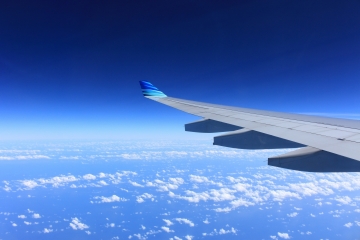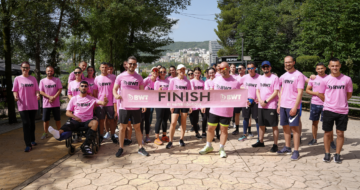Air France-KLM operates first long-haul flight with cooking oil

French-Dutch airline group Air France-KLM has taken to the skies its first long-haul flight using so-called SAF. This is a sustainable aviation fuel made from used cooking oil by the French oil and gas group Total.
French-Dutch airline group Air France-KLM has taken to the skies its first long-haul flight using so-called SAF. This is a sustainable aviation fuel made from used cooking oil by the French oil and gas group Total.
French-Dutch airline group Air France-KLM has taken to the skies its first long-haul flight using so-called SAF. This is a sustainable aviation fuel made from used cooking oil by the French oil and gas group Total.
The substance was mixed with normal kerosene for the flight from Paris to Montreal, Canada. As a result, 16 percent of the fuel mix in the aircraft consisted of the sustainable alternative.
The company has been trying to be a pioneer in the field of sustainable aviation fuel for some time. Last year, KLM allowed a passenger aircraft on the Amsterdam-Madrid route to fly partly on synthetic kerosene produced by using renewable energy.
Starting next year, all flights departing from France must have 1 percent SAF in their fuel mix. In doing so, the French are ahead of a European goal of achieving a 2 percent share for the biofuel by 2025 and 5 percent by 2030. That should help reduce CO2 emissions.
In the aviation industry there is still disagreement about the new rules. This mainly concerns who exactly should be affected by the rules. Budget airlines such as Ryanair and easyJet, which mainly fly within Europe, want the rules to be the same for all European companies. But other airlines, including Air France-KLM, fear unfair competition from non-European airlines, which also have long-haul flights to Europe and would not be covered by the new rules.
"We have to be on equal footing," Air France-KLM chief Ben Smith stressed again. "We cannot have a situation where airlines based outside Europe can undercut us, and that is a real concern."
Latest insights & stories

ROAD SAFETY
Since 2018, the number of traffic casualties in Flanders has risen again. Currently, the figures are stagnating, but the risk of accidents with injuries remains high for vulnerable road users in Flanders. And that while traffic should be safe for all users and modes. We want to change this by focusing on transparent policy, training on safe behavior, infrastructure improvements, legislation and enforcement.

What is needed for a more circular construction sector? Insights from Sien Cornillie, Circularity expert at NAV
NAV, or "Netwerk Architecten Vlaanderen," is a professional organisation for architects in Flanders. It offers various services including professional development and advocacy for the architectural sector. NAV also fosters networking opportunities and provides advice on legal, technical, and management aspects. The network is currently working on a position paper on circularity. We sat down with Sien Cornillie, an expert on circularity and energy at NAV. This interview reflects her own opinion.

A Global Movement: The World Unites in a Pink Pledge for Clean and Sustainable Water
5,000 participants. 32 countries. €30,000 funds raised. And that's just the beginning.
Picture this: One step that sends ripples across the globe, transforming lives and creating waves of change. You might wonder, how can such a simple action for most of us have such a profound impact?